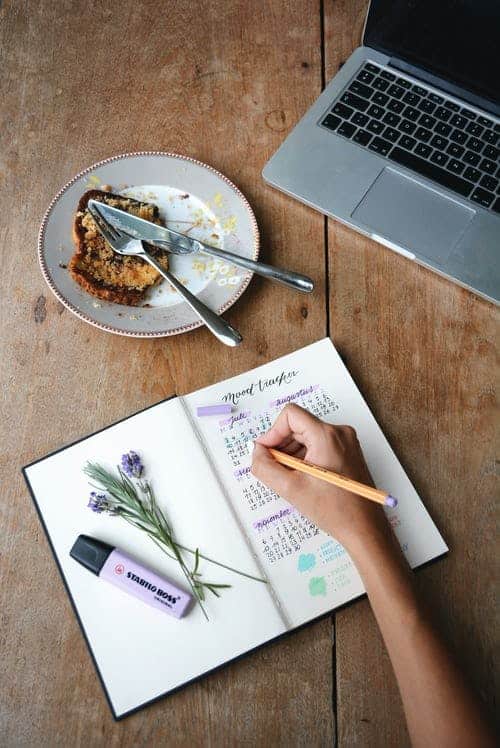40 Journal Prompts for Anxiety
An affective way of relieving stress and calming the mind is to use journal prompts for anxiety in your self-care routine.

Journaling can help sort through your racing thoughts and stop you from catastrophising (always thinking in absolutes – a common characteristic of anxiety).
It allows you to rationalise with negative self-talk and sort through what you’re feeling.
Meanwhile, journal prompts guide you with what to write. They point you in the right direction.
You’re very much the captain of the ship, but prompts are the ship’s chief mate standing next to you at the helm, gently encouraging you.
As someone who’s suffered from GAD (Generalised Anxiety Disorder) since my early teens, I’m a little pissed off that it took me until my late 20s to figure out how useful journal prompts – and journaling in general – can be when tackling your racing thoughts and calming the mind.
Lucky for you, you can learn from my mistakes and get started today.
How to start a journal for anxiety
Starting a journal for anxiety, or journal for your mental health in general, can be as simple or as intricate as you want to make it.
I have a whole post on how to start a journal, but, for now, the main takeaways are:
- Get a journal – Any journal, it doesn’t have to be fancy but preferably get one that you feel called to pick up and write in.
- Use prompts – I have tons of journal prompts on this blog. Prompts save you time because they guide you with what to write.
- Use printables – Printables save you time and stress because they lay out exactly what you need to journal about. I have journal printables available on my Etsy, if this sounds like something that would help you on your journey.
- Just start – Honestly. Just pick a journal prompt for anxiety and get writing. See where it takes you. Then try and do the same again tomorrow.
I have a whole post of journaling tips for beginners if you’re just starting out and having trouble in which I go into how to form a journal habit, what to write in your journal, and much more.

40 Journal Prompts for Anxiety
#1. What is my biggest worry right now? Why?
#2. What is one step I can take towards tackling my biggest worry right now? (Just focus on one step, not the next 20. Just the next one.)
#3. Pick a genuine problem that’s causing you stress. Write a short action plan to deal with it.
#4. What are five goals I can achieve this week?
#5. What are five small goals I can achieve today?
#6. What are five big goals I can achieve this year?
#7. What do you feel holds you back?
#8. Do you self-sabotage? If so, when does this tend to happen and why do you think this is?
#9. How do you react to high-stress situations?
#10. Write about a time you overcame a high-stress situation.
#11. What are self-care activities that instantly make you calmer?
#12. Write about a person in your life who has a calming influence on you. You don’t have to know them in person.
#13. Who is your role model in life and why?
#14. Write a letter to a person who’s made you anxious.
#15. What triggers your anxiety?
#16. How do you react to triggers?
#17. What are three things you can do next time you’re triggered?
#18. Write about the last time you had a panic attack. What triggered it specifically and how did you react?
#19. What are three things you can do next time you feel an anxiety attack coming on?
#20. What are two types of breathing exercise that help calm you down.
#21. Write about one person you can turn to in times of need.
#22. How does anxiety in others make you feel?
#23. Write about a time you’ve helped someone else overcome something that was causing them stress or anxiety.
#24. What are your three biggest fears and why?

#25. What is one limiting belief you hold about yourself and your abilities? Write about why this limiting belief is unhelpful and probably untrue.
#26. What are 10 things you like about yourself?
#27. What are five things other people admire in you?
#28. What are five qualities you admire in other people?
#29. If you were an animal, what would you be and why?
#30. What colour is anxiety to you and why?
#31. Write about a happy memory.
#32. Write about three things that make you feel calm?
#33. When do you feel most in control of your anxiety?
#34. What are five songs that make you feel calm, happy and content?
#35. What are three obstacles that you’ve overcome recently?
#36. What are three obstacles you’ve overcome in your life as a whole?
#37. Write about one thing you’ve done that you’re really, really proud of.
#38. What are three habits that I need to work on?
#39. How does anxiety affect your life?
#40. How would my life look without anxiety?
(Check out my Journal Prompt Library for 750+ journal prompts to help you transform your mindset all in one place.)
What do you write in a journal for anxiety?
As well as using journal prompts to help organise your thoughts, rationalise them, and deal with them positively going forward, there are also some other journal techniques I use for calming my anxiety.
These include:
- Practising gratitude
- Goal/intention-setting
- Scheduling in self-care
- Writing out affirmations
All of these journaling techniques work to improve my mindset and relieve stress.
When all of this is said and done though, using journal prompts for anxiety is still the most affective journaling exercise that I currently use.

It’s important that you experiment and find the most useful techniques for you.
What works for me, might not work very well for you and vice versa.
Other types of journaling technique that may help relieve your anxiety include:
- Stream of consciousness/free writing – just spill all your worries onto the page (I sometimes do this instead of writing about a journal prompt)
- Doodling
- Art therapy
- Poetry
- Writing a letter (that you never send)
- Planning your day
- To-do lists/list writing in general
- Dream journaling (if your dreams are causing you anxiety)
- Scripting (writing about your dream life, free of anxiety)
- Listing your wins
I wouldn’t advise trying to do all of these at once, especially if you’re new to journaling, as it would be too overwhelming and there aren’t enough hours in the day.
However, try one or two, give them a month or so and see if they help you.
Observe which journaling techniques help ease your anxiety and relieve stress, and stick at those.
How do you express anxiety in writing?
The most affective journaling exercises for my anxiety are using journal prompts for anxiety and free writing.
The key is to be open and honest with yourself – no one else has to read what you’ve written, not even you.
When you get your thoughts and worries down on paper, it often feels as if they’ve been physically lifted out of your mind. It makes them feel much more manageable and easier to deal with.

You’re able to rationalise with irrational anxious thoughts and sort through solutions, if there are any.
How to use journal prompts for anxiety
Using anxiety journal prompts gently pushes you in a certain direction.
They encourage you to hone in what’s making you anxious and deal with it.
This helps because you’re being proactive in calming your mind, which ultimately helps relieve stress.
Free writing for anxiety journal
Free writing – simply writing anything that comes to mind – is a really affective way of unloading and unpacking your racing thoughts.
What you write might not make much sense, but that doesn’t matter. What matters is getting those racing thoughts out of your brain and onto paper.
My top tips when it comes to free writing are:
- Set a timer so that you don’t write forever and allow your anxious thoughts to run away with you.
- Set a limit – for example, one page in your journal.
- Meditate afterwards to help clear your mind further.
Free writing is a great practise to get into as it also encourages you to open up more and be honest with your feelings, which is great for our mindset.

Even if we’re not telling everyone else our deepest worries, at least being honest with ourselves is paramount.
Other ways to relieve anxiety and stress
As well as journaling, there are other steps we can take to help reduce anxiety.
- See a therapist – If one is available and accessible to you, that is.
- Practise self-care – Taking care of our emotional, social, mental, physical, financial and spiritual needs is super important for our mindset and mental heath.
- Move your body – Find a type of exercise that you genuinely enjoy doing.
- Get enough sleep – Sleep is crucial for our mental and physical heath. I feel so anxious when I don’t get enough sleep.
- Meditate – This helps clear the mind and improve mindfulness.
- Learn self love – Accepting who we are is so liberating.
- Nourishing our bodies – Ditch the diet (it only leads to food and weight anxiety) and nourish our bodies with delicious, nutritious food.
- Talk to people – A problem shared is often a problem halved. Humans are social creatures, we need to interact with others. Even us introverts.
- Set boundaries – Learn to say ‘no’ to situations that make us feel overly stress or anxious. Learn your limits.
- Challenge yourself – While you should know your own limits, testing them every once in a while can be amazing for your mindset.
- Breathing techniques – Learning breathing techniques – such as box breathing – have been amazing for my anxiety, especially when I feel as if I’m on the edge of a panic attack.
- Yoga/Stretching – Stretching helps relieve tension in the muscles caused by anxiety.
Ultimately, using journal prompts for anxiety is one piece of the puzzle.
I really hope they help you on your journey to a healthier mindset and mental heath.
I have a journal printable dedicated to helping you improve your mindset on my Etsy, if you want to check it out.

A witchy ray of sunshine who loves to help others on their journal journey. I’ve been journaling since childhood and have since gone on to earn a degree in English and a diploma in Shadow Work. I love my plant babies, yoga, and anything spooky. Find out more on my about me page.

